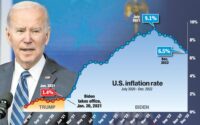LA High schooler sues school district, USDA for making her promote cow milk
A high school student from Los Angeles is suing her school district and the United States Department of Agriculture for violating her first amendment rights after she was told she could only promote non-dairy milk if she also promoted animal-based milk.
Marielle Williamson, a 17-year-old senior at Eagle Rock High School, asked school officials if she would be allowed to host a “day of action” promoting and distributing information about the benefits of non-dairy milk last fall, according to the Washington Post.
She was told that she could, but would also have to provide information about the benefits of dairy milk, which she said defeated the purpose of the event — and violated the first amendment, according to the lawsuit.
“By compelling Marielle to simultaneously distribute the dairy misinformation that she seeks to refute, District Defendants have violated Marielle’s free speech rights,” her lawyers argued in the suit filed May 2 in District Court with the nonprofit Physicians Committee for Responsible Medicine as a co-plaintiff.
“More than that, [the defendants] have laid bare the extent to which [USDA] treats dairy as sacrosanct, both as a matter of law and policy.”

The USDA, which oversees federal school meals policy, requires that milk be served with public school lunches — even as less and less people are drinking dairy milk in the US, opting for non-dairy options instead like oat, almond and coconut milk.
Despite a rise in popularity in dairy-based cheese and yogurt, 42 percent of American households purchased plant-based milk in 2021, according to National Consumer Panel data, WaPo reported.
Plant-based milk sales grew 19 percent from 2019 to 2022 while animal-based liquid milk saw a 4 percent drop in the same period.
Milk is particularly unpopular among Gen Zers — who are drinking 20 percent less milk than the national average, according to Circana consumer data.
The trend away from milk has caused problems for some school districts as they are beholden to the USDA’s regulations.
Williamson told the paper that she was shocked when she requested plant-based milk instead of cow’s milk to be served with her lunch and was told she’d need a doctor’s note.

Shannon Haber, a Los Angeles Unified School District spokeswoman, told WaPo that the district follows USDA guidelines, and supports its “students with nutritious meals and healthy alternatives for those who have specific dietary requests and requirements.”
According to the Washington Post, USDA says schools “must not directly or indirectly restrict the sale or marketing of fluid milk at any time or in any place on school premises or at any school-sponsored event,”
The USDA reimburses schools for every meal served, including dairy milk, according to the Washington Post.

While Lactose-free and nondairy options are sometimes offered, they are typically more costly and would have to be covered by the school district.
Seven percent of all liquid milk in the US is consumed in schools, Matt Herrick, senior vice president of the International Dairy Foods Association, told the paper.
Williamson said that the lawsuit is about respecting students’ choices.
“There’s so much behind it, but it’s overshadowed by this, ‘Drink milk for strong bones — we need it!’” she said.


